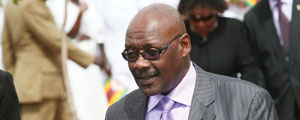
The Ministry of Health and Child Care is not distributing contraceptives to children and does not intend to do so at all, minister Dr David Parirenyatwa has said. Dumisani Sibanda
Addressing a Press conference in Harare yesterday, Parirenyatwa dismissed reports attributed to officials in his ministry that government was already distributing contraceptives to children as young as 10 years old at 91 centres around the country.
The minister said he was “not sure how that information originated”, adding the reports were based on “misinformation”.
Over the weekend, director of Family Health in the ministry Dr Bernard Madzima was quoted in the media as saying government was pushing for the introduction of a legal framework to support the distribution of contraceptives among adolescents.
“We as a ministry do not have a policy that advocates giving contraceptives to under-age children, we are very clear about it,” Parirenyatwa said.
“Clear because we are guided not only by the policy, but by the socio-cultural and medical prerogatives in our country. Certainly as you know the age of majority is 18 years and the age of marriage is 16 years.”
However, Parirenyatwa — who was accompanied by his deputy Dr Paul Chimedza, permanent secretary Dr Gerald Gwinji and director for infectious diseases Dr Gibson Mhlanga — said children were receiving “age-specific” sex education at schools.
“What we do with the Ministry of Education is that we advocate that there must be gradual sex education to children as they come up. What we pride ourselves in is to give information, to give education to those children and you are aware that this ministry (Health and Child Care)is in the forefront of fighting HIV and Aids and, of course, if we were to advocate for sex for 10-year-olds, you can imagine how the pandemic can spread,” said Parirenyatwa.
- Chamisa under fire over US$120K donation
- Mavhunga puts DeMbare into Chibuku quarterfinals
- Pension funds bet on Cabora Bassa oilfields
- Councils defy govt fire tender directive
Keep Reading
“What we have done is actually advocate for as much a delay as possible in a youth’s sexual debut. When I say sexual debut, I mean the age at which you start sex. We always advocate that youths delay their sexual debut as much as possible, certainly until marriage, that is what we advocate for. So our policy clearly does not talk about giving contraceptives to under-age children.”
The report sparked outrage among parents who condemned the move as dangerous, irresponsible and immoral.
Parirenyatwa said the last survey done had shown the country’s average sexual debut was 15 years and nine months.
He said even for college students, his ministry encourages abstinence, but in the case of those who felt the strong urge for sex, they should use condoms and other contraceptives.
“We are fighting Aids very, very vigorously and we hope you (media) will help us to pass on the message that we as a ministry we do not condone distributing condoms to under-age children. I am not sure how that information originated, but what clearly is important is to give the correct information,” said Parirenyatwa.
The minister said unwanted pregnancies and abortions, especially in the age group of 17 to 24, were “high”.
“That is why we talk about safe sex (in the 17-24 age group). As a ministry, we are also fighting sexual abuse of children and, of course, sexual assault in terms of rape among adults,” he said.
Speaking at the same occasion, Dr Chimedza said there was also need to conduct intensive awareness campaigns to stop traditional practices that result in sexual abuse of children.











